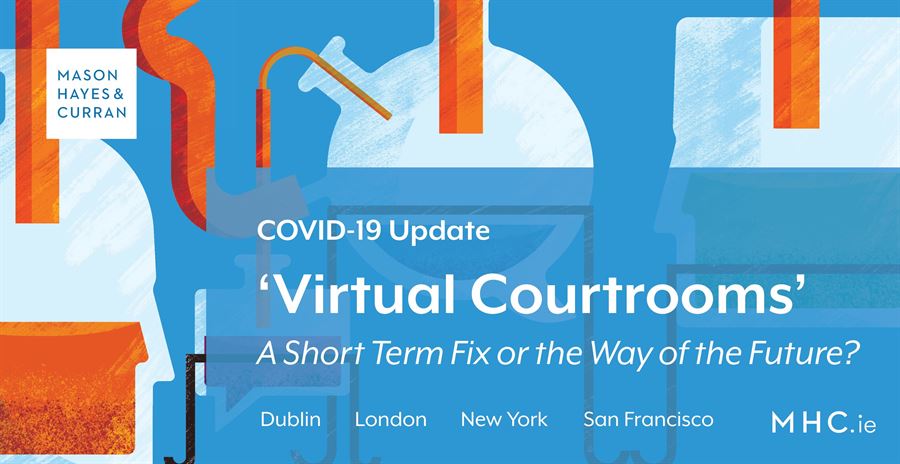COVID-19: ‘Virtual Courtrooms’ – A Short Term Fix or the Way of the Future?

The new ‘virtual courtroom’ pilot scheme announced by the Chief Justice in his public statement on 31 March 2020 is a welcome development. It was hoped that the scheme would be in place for the start of the new legal term and indeed remote Court of Appeal hearings have been scheduled for 20 April 2020. We discuss how the scheme might work in practice.
Virtual courtroom pilot to be trialled
Whilst first announced in January 2020 via the Courts Service ten year strategy document, the possibility of ‘virtual courtrooms’ has materialised quicker than anticipated, in light of the challenges posed by the COVID-19 Pandemic.
It is expected that High and Circuit Court civil matters, Court of Appeal and Supreme Court hearings will feature in the pilot, which is expected to begin at the start of the new legal term. Subject to successful initial trialling of the system, it is understood testing would then continue in order to ensure that the system works satisfactorily and any teething problems can be addressed and resolved.
Innovation in the face of adversity
The decision comes as the COVID-19 crisis has led to a near shutdown of the courts with only urgent matters, ongoing criminal trials and sentencing hearing proceeding in recent weeks. This reduction in activity was introduced to comply with Government imposed physical distancing guidelines.
Whilst undoubtedly aimed at optimising the level of court business that can be conducted during these challenging times, if the pilot is a success, then there may be an appetite to continue the use of virtual trials once current restrictions are lifted. Trials conducted in this manner would minimise the necessity for attendance at physical hearings, especially for busy expert witnesses. This in turn may reduce instances of adjournments due to the unavailability of witnesses. It remains to be seen however how these trials will work in practice with effective mid trial communication between counsel and their instructing solicitors and witnesses being one challenge which will need to be managed carefully.
Our Insurance & Risk team were delighted to participate recently in a moot Circuit Court trial presided over by Judge John O’Connor. General feedback included concerns about ensuring adequate communication between counsel and solicitor, and solicitor and client while the trial was on-going. Concerns around the logistical difficulties of referring witnesses to certain documents was also discussed. Overall however, the trial ran very efficiently and we can see a number of case types for which remote trials would work perfectly, such as infant rulings and ex parte applications.
While virtual trials may seem a novel concept, the proposals are not the first of their kind. In Ireland, the Private Residential Tenancies Board currently allows for virtual hearings to resolve landlord and tenant disputes. Digital remote-court use has already been rolled out successfully in Australia and has been used very recently for the first time by the UK Supreme Court and High Court to hear cases and deliver judgments.
Comment
The digitisation of court proceedings is a seismic move by the Courts Service. There will of course be concern over the impact of losing the physicality of a traditional courtroom and its nuanced bearing on court proceedings. However, we believe this innovation has the opportunity to bring many benefits.
We will be watching with very keen interest as the first remote trials are rolled out this week. If the system works well, it has the potential to revolutionise the way in which court time is utilised, not just during the current crisis, but also on a longer term basis.
For more information on the impact of COVID-19 on your business, contact a member of our award winning Insurance & Risk team.
The content of this article is provided for information purposes only and does not constitute legal or other advice.
Share this:




